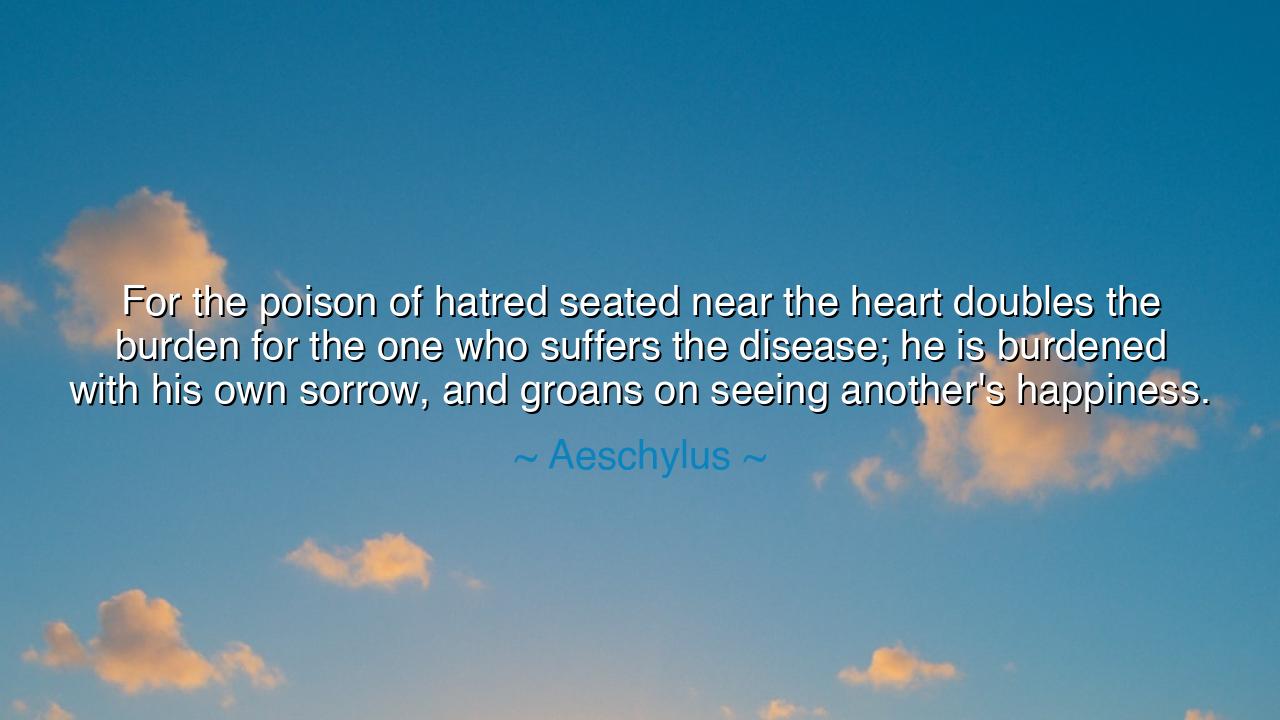
For the poison of hatred seated near the heart doubles the burden
For the poison of hatred seated near the heart doubles the burden for the one who suffers the disease; he is burdened with his own sorrow, and groans on seeing another's happiness.






The ancient poet Aeschylus, whose words echo through the centuries, understood the nature of the human heart better than most. In his wisdom, he warned us: “For the poison of hatred seated near the heart doubles the burden for the one who suffers the disease; he is burdened with his own sorrow, and groans on seeing another's happiness.” This saying is a mirror held before the soul, showing that hatred does not destroy the object of its wrath—it destroys the one who harbors it. It is a poison, not of the body, but of the spirit, seeping slowly until all joy, peace, and clarity are consumed by darkness. The ancients believed that every emotion has a dwelling place within us, and hatred—when allowed to live near the heart—corrupts the very source of life itself.
Consider what it means for this poison to “double the burden.” Aeschylus speaks of a suffering that multiplies: first, the natural sorrow that life brings to all; second, the added torment of seeing others at peace, at joy, and being unable to rejoice with them. The man of hatred carries a chain around his own neck, forged not by his enemies, but by his own hands. The happiness of others becomes a thorn to him, not because it harms him, but because his diseased heart cannot bear light. The gods themselves, in their justice, punish such souls not with thunderbolts, but with envy.
In the scrolls of history, we find endless examples of this truth. Think of Cain and Abel, the sons of Adam. Cain, consumed by hatred and envy, could not endure the sight of his brother’s favor. His jealousy festered like venom, until it drove him to raise his hand in murder. But even after Abel’s blood soaked the earth, Cain found no peace. He wandered, cursed not by God alone, but by his own heart, which became a barren wasteland. Thus, the poison Aeschylus spoke of claimed another victim—not the innocent, but the one who bore it.
In the age of empires, too, this poison ran its course. Consider the fall of Emperor Nero, whose hatred burned against all who outshone him. The Roman throne, which might have been his crown of glory, became his furnace of torment. He saw enemies in every shadow, rivals in every friend. His heart, swollen with fear and malice, finally turned upon itself. Surrounded by the ruins of his own deeds, Nero met his end not by the sword of another, but by his own. Truly, hatred is a self-consuming fire—it devours its bearer before touching its prey.
Aeschylus understood that such emotional corruption blinds us to the divine order of the world. Life, with all its trials and triumphs, was meant to be shared in harmony. The man who rejoices in another’s joy enlarges his own soul; the man who resents another’s blessing shrinks his spirit into a narrow cage. To hate is to reject the beauty of existence, to rebel against the rhythm of creation. This is why hatred “seated near the heart” is more deadly than any wound to the flesh—it divides a man from life itself.
What, then, is the cure for this poison of hatred? The answer lies in understanding, in compassion, and in the noble art of forgiveness. When one learns to look upon others not as rivals but as fellow travelers under the same sun, the burden lightens. The heart, freed from envy, becomes like a clear stream reflecting heaven. Even in sorrow, such a heart finds peace, for it no longer competes with the joy of others but rejoices in it. The wise man learns that the victory over hatred is not a battle against others—it is a triumph over oneself.
Let this teaching be passed on to those who come after us: guard your heart, for it is the fountain of life. Do not let the poison settle there, for it will turn your days bitter and your nights restless. Instead, cultivate mercy, gratitude, and empathy. When you see another prosper, bless them; when you see another rejoice, join them; when you suffer, remember that love lightens pain, but hatred doubles it. In this way, you will walk the earth as a free soul, unburdened by envy, radiant with peace.
And so, the voice of Aeschylus still calls to us across the ages: purge your heart of hatred, and your spirit shall rise like dawn over a tranquil sea. But if you feed the poison within, you will chain yourself to sorrow. The choice, as it has always been, rests in the heart—the very throne of the human soul.






AAdministratorAdministrator
Welcome, honored guests. Please leave a comment, we will respond soon